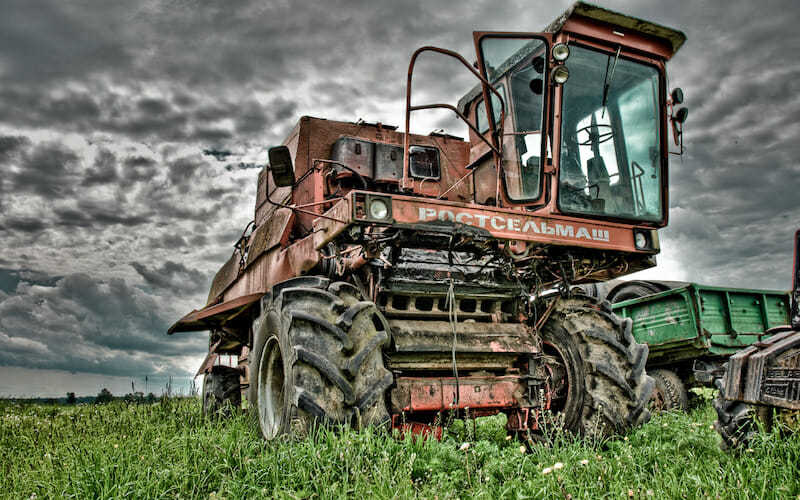
The Land Fetish
Doctors are the hardest people in the world to control.
When governments attempt to control the lives of doctors, they find it’s not an easy task. If they tax them too highly, doctors leave. If the state attempts to make them involuntary servants of the government, again, they leave.
It’s so hard for government to control the lives of doctors because physicians are highly skilled in a field where there is great demand. Harass a doctor in one country and he’ll easily move to another.
The earnings of a physician are directly tied to the knowledge he has in his head. He takes his earnings potential with him wherever he goes. The state may confiscate his office, stethoscope and examination room, but it can’t confiscate his knowledge. Because a doctor’s skills are widely sought after, many countries are eager to welcome him to their shores. So, policies that harass doctors redistribute medical care to countries where they will not be harassed.
With farmers it’s a different matter. A farmer must work with land to prosper. They are tied to the soil. The many stories in novels and films about how farmers are linked to their lands make farming sound romantic, but, in reality, it means that farmers are easily controlled or destroyed by governments. A physician can be a physician anywhere. A farmer has to have land. The physician easily relocates. The farmer doesn’t.
Many people found it odd that, in Zimbabwe, Mugabe’s regime did its best to force a skilled workforce onto the land. The new farms its policy created were not successful. In fact, food production decreased and hunger increased. It didn’t make the nation any richer. It didn’t improve the life of poor people. In fact, on virtually all levels, people were worse off.
But a Zimbabwean mechanic, like a physician, could take his earnings potential with him. He could pack up and move south of the Limpopo and still fix cars. His earnings potential, too, is mainly in his head. Farmers also have important knowledge in their heads but the amount of land they need ties them down. It limits their options. A doctor can perform medicine in a huge city or in a small town. He can heal the sick on the side of a mountain or in the middle of a desert. Farmers don’t have that luxury.
I suspect the reason the Zimbabwean government forced people onto the land was because it made it easier for the state to control them. Of course, apologists for the regime will have other excuses. Some argue it was done to make people more prosperous. They ignore the fact prosperity didn’t increase as a result but declined.
They also ignore other obvious facts. The wealthiest places in the world, aren’t farming regions but big cities. If you look at the bustling Kowloon district of Hong Kong, you’ll see prosperity, but very few people who own land. It wouldn’t do them much good if they did. There are 43,033 people per square kilometre there. Give them all an equal share of the land and they wouldn’t own very much.
Manhattan is one of the wealthiest spots on earth. Divide the land there up equally and you’d have to split one square kilometre of land between 25,850 people. In wealthy Singapore you’d split that same amount of land between 5,516 people. There is really no correlation between land ownership and wealth. Many rich people are land poor and many poor people are land rich.
This also means you aren’t likely to increase the well-being of the poor through the redistribution of land, especially if you remove productive farmers and replace them with less-productive ones. All that will do is reduce food supplies, increase food costs and harm the poor.
People in these cities are very wealthy by world standards because they rely on what they know. They are mobile, not tied to the land. They have lots of other people to trade with meaning they are more likely to find a profitable trade. Tie them down to the land and they’d starve to death. Give them each a plot of land and they wouldn’t have enough to grow the food they need. In fact, in many places they wouldn’t even have enough for a small house, let alone land to farm.
If you want to improve the lot of the poor, more knowledge, not more land is the answer.
The connection between land and wealth is tenuous at best. At most, the wealthy of the world often own only a small plot of land where they live. And in the richest places of the world, they might not even own that. Very few rich people in Manhattan own land. If they do, it’s a tiny share of the land on which the apartment building is located. Many simply rent accommodation and don’t own land at all.
When a government proposes policies to make people reliant on land ownership, they are not increasing the wealth of people. These policies won’t make people more prosperous. But they will mean that people are more easily controlled. So, while many governments around the world say they do these things for the former reason, the reality is they often do it for the latter.
This article was originally posted in iAfrica.

